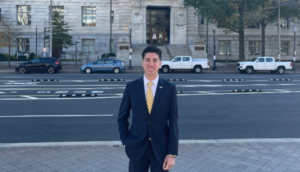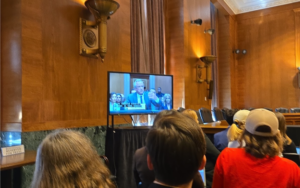Many Students Call to Defund CUA Program Board

Image Courtesy of CUA Program Board
By Anthony Curioso
Should CUA defund its Program Board? Several students seem to think so.
During the January 27 SGA Senate meeting, Grace Marino, a junior accounting major and Student Body Treasurer, addressed the senators. Marino detailed the state of the Student Activity Fee (including the clubs and organizations that receive funding from this source) and outlined the work that the Treasury Board accomplished in the fall semester.
Marino’s presentation included three pie charts. The first chart showed the percentage of the Student Activity fee given to clubs before the start of the school year compared to what is allocated later. The second chart displayed how the Treasury Board divides pre-allocated funding among the student organizations that receive it. The third chart illustrated how much of the remaining Student Activity Fee funding that clubs receive during the school year.
However, several senators called attention to one particular aspect of Marino’s pie charts: the fact that CUA’s Program Board receives thirty-one percent of the portion of the Student Activity Fee funding that the Treasury Board sets aside at the beginning of the school year to pre-allocate to clubs and student organizations. The funds allocated to student clubs at the start of the school year represent eighty-six percent of the total amount distributed by the Treasury Board this year.
CUA Program Board (PB) hosts regular events for undergraduate students that center around various activities and themes, such as “late night breakfast” during freshman orientation and each semester’s finals week. PB also hosts five larger-scale events spread throughout the school year: the Capital Fest concert in September, the Mistletoe Ball in December, the “Mr. CUA” pageant in March, the Founders Day Ball in April, and “Senior Week,” a collection of activities and events for graduating seniors during the week leading up to Commencement in May. In between those more significant events, PB also hosts smaller “creative” events that change every year.
The information from the Treasury Board about the Program Board’s funding allocation led several senators to call for reducing this funding. The senators hope this measure will save money for the University, helping CUA to face its thirty-million-dollar budget deficit.
Some students echoed the senators’ calls to defund the Program Board in the comments of an Instagram post from Joshua Ortiz, a sophomore theology major and senator for the School of Theology and Religious Studies. Many other students voiced the same desire on the social media app Fizz.
Ortiz commented on how he and the other senators received information about the amount of funding that the Program Board gets.
“The Senators only found out at the Senate meeting [last Monday] that the Program Board receives the amount of pre-allocated money that it does,” Ortiz said. “Treasury Board did not want to release the pie charts showing funding allocations, but I value transparency, so I shared them on my Instagram for the student body to see.”
Any adjustment to the Program Board’s funding allocation must pass a Senate vote and may require approval from the SGA Treasury Board.
Ortiz commented on the steps he is taking to address Program Board funding.
“I am currently drafting a resolution to request an inquiry into what the Program Board is spending its money on,” Ortiz said.
Many opponents of hypothetical PB budget cuts worry that reducing the current funding level will prevent the continuation of popular annual events.
Jack Hermes, a sophomore finance and theology major, senator for the Class of 2027, and Chair of the Senate Committee on Rules and Administration, commented on a more specific action plan he wants to take.
“I would like to ask the University to audit, account for, and publish the financials of student organization spending,” Hermes said. “I also want to help our student chapters of organizations like Global Medical Brigades and Habitat for Humanity find funding sources outside the Student Activity Fee to prevent misuse of the Student Activity Fee according to the bylaws.”
Ortiz commented on his proposal to cut some Program Board funding but save the more popular events.
“The attendance numbers at Program Board events over the last calendar year, according to the Office of Campus Activities, do not justify the Program Board receiving so much of the student activity fee,” Ortiz said. “We should reallocate some of the funding the Program Board was using for their smaller events to other campus clubs and ask the Program Board to use the rest to enhance their events and make them more cost-effective.”
Hermes commented on why Ortiz’s proposal is in the student body’s best interest.
“It’s not fair that one organization gets such a large clump of money when it’s only representing a fraction of the student body,” Hermes said.
We will have to see what happens regarding these calls to defund the Program Board.




